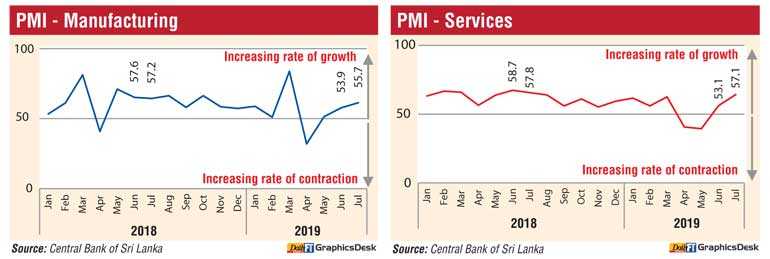Saturday Feb 14, 2026
Saturday Feb 14, 2026
Saturday, 17 August 2019 04:43 - - {{hitsCtrl.values.hits}}

Gradual recovery since the Easter Sunday attacks saw manufacturing and services expanded in July, with a significant increase in new orders and production, the Purchasing Managers Index (PMI) released by the Central Bank showed.
Manufacturing activities expanded further at a higher rate in July 2019, recording an index value of 55.7, which is an increase of 1.8 index points compared to June 2019. This expansion in manufacturing PMI is mainly attributable to the significant increase in New Orders and subsequent increase in Production, especially in the manufacturing of food & beverages sector.
The increase in New Orders was mainly due to the gradual recovery of the economy from disruptions related to the Easter Sunday attacks.
Meanwhile, Employment increased at a slower rate during the month of July, although many respondents in the textile and apparel industry highlighted that they experienced a higher rate of labour turnover during the month.
The Stock of Purchases increased significantly with the expansion of New Orders and Production as well, as a precautionary measure to face possible disruptions during the upcoming election period, together with festive season demand. Further, the Suppliers’ Delivery Time lengthened to the neutral level, indicating the same delivery time as the previous month, mainly due to the normalisation of tight security measures deployed after the Easter Sunday attacks.
All sub-indices of PMI Manufacturing, except Suppliers’ Delivery Time, which was on neutral level, exceeded the threshold of 50.0 (neutral), signalling an overall expansion in manufacturing activities during the period under review. The Services sector continued to expand in July 2019, underpinned by accelerated expansion in New Businesses, Business Activity and Expectations for Activity compared to June 2019. This indicates a further recovery of the services sector after the Easter Sunday attack.
Business activities of wholesale and retail trade; accommodation, food and beverage; financial services; and transportation sub-sectors expanded for the second consecutive month in July 2019. Service providers’ optimism on the next three months business outlook strengthened to a 29-month high, as expectations for activity expanded across most of the sub-sectors. However, Employment recorded a deterioration compared to previous month, as there is a time lag for filling vacant positions and replacement of labour-intensive work by technology.
Respondents in financial services sub sector highlighted that they have reduced lending rates (prices charged) in parallel to the deposit rates reductions. Accordingly, Prices Charged in the Services sector declined in July 2019. Meanwhile, Expected Labour Cost increased at a higher rate in July 2019 due to routine salary increments.